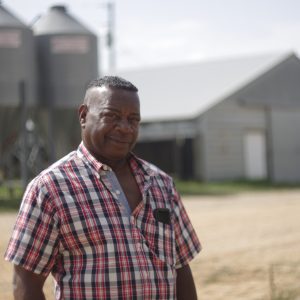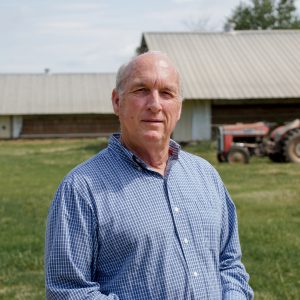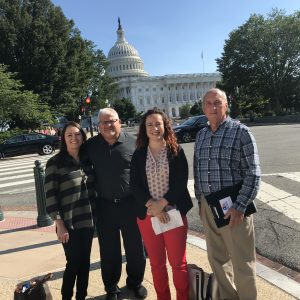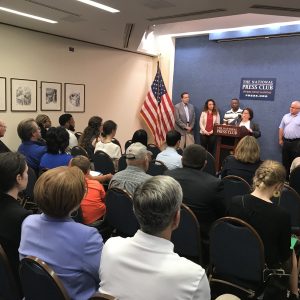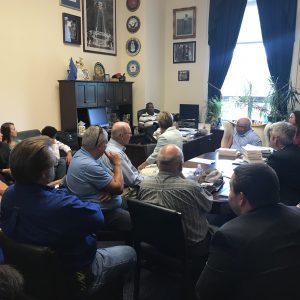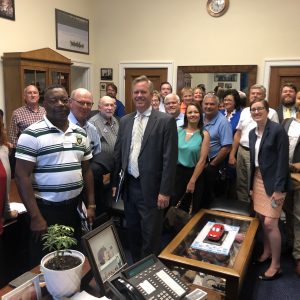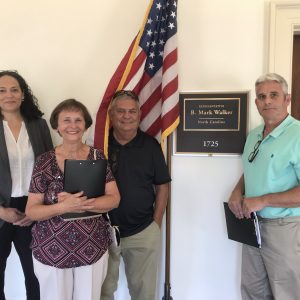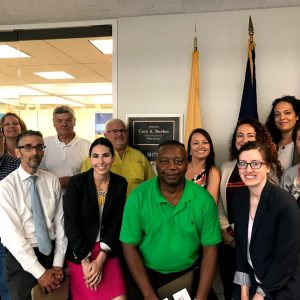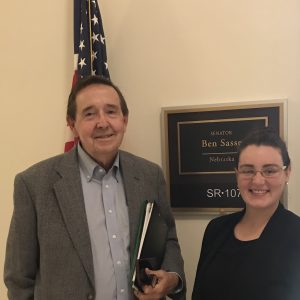Last month, our Farmer Leadership Fund supported travel costs for family farmers to visit Washington, DC and make sure their voices were heard. This is part of the Stand With Farm Families campaign, where we’ve joined with Rural Advancement Foundation International (RAFI-USA) and other partners to create a petition urging the USDA to issue rules around fairness in the agriculture industry and to protect farmers’ basic rights. So far, more than 1,000 Farm Aid readers have joined the effort, and with our partners, the petition has been signed by more than 79,000 people in total.
There’s still time for you to take action. Sign the petition by clicking here.
RAFI-USA issued a press release about the farmers’ trip to Washington, DC, and we’ve reprinted it below along with a gallery of photos they took.
Family Farmers Go to Washington, Cry Foul Over Meat Industry Abuse
Family farmers and advocates from the country’s top agricultural states took to Capitol Hill this week to expose what they say have been decades of abuse by the nation’s largest meat companies. At a press conference on Tuesday, the group launched its Stand With Farm Families campaign, sharing accounts of predatory contracts, rigged markets and retaliation that many claim have driven them into bankruptcy. “Corporate bullying, intimidation and a mafia-like mentality has taken control of the chicken industry,” said Anthony Grigsby, an Alabama law-enforcement officer-turned-poultry-grower and his wife Christy, whose family has grown chickens for three generations. “In 2019, as a result of retaliation for speaking out, we had to file for bankruptcy. Like many other farmers, we’ve lost everything–our farm, our family home, and the house where we planned to spend our retirement.”
The Grigsbys were joined at the conference by farmers with similar experiences from North Carolina to South Dakota. Collectively, the group launched a petition on Change.org that had seen over 30,000 signatures by Tuesday morning. They expect to see tens of thousands more in a matter of days. According to Amanda Hitt, whistleblower attorney with the Food Integrity Campaign, the goal of Stand With Farm Families is to urge the USDA to resurrect and add specific protections to its Farmer Fair Practices Rule, also known as “GIPSA.” “We need these protections,” said Hitt. “The rule would do a lot to level the playing field between farmers and corporations.” The rule was created under the Obama Administration as a clarification of the Packers and Stockyards Act, a law passed in 1921 to tame rampant exploitation in the meatpacking industry. GIPSA was withdrawn by the Trump Administration in 2017, but the USDA announced that it would reexamine the rule this summer.
In a pre-conference meeting with the USDA, farmers and advocates doubled down on the need for strong safeguards for farmers, animals and consumers. “Government has failed to do its job,” says Joe Maxwell, President of the Organization for Competitive Markets, an organization that advocates for economic justice on behalf of America’s independent family agriculture. “As a result, a handful of multinational corporations and their overpaid CEOs control our food system, driving family farmers off the land, abusing workers and leaving consumers without safe and healthy food choices.”
On Tuesday afternoon, the farmer coalition presented at a bi-partisan congressional briefing, organized by Sen. Jon Tester (D-Montana) and Rep. Marcy Kaptur (D-Ohio). “Over 90% of the meat on American dinner tables comes from family farmers under contract with big companies.” emphasized Sally Lee, head of the contract agriculture program at Rural Advancement Foundation International-USA, a North Carolina-based nonprofit that provides services and advocacy for farmers across the Southeast. “But those big companies are not letting the farmers do the farming. Today farmers get less than 14% of each dollar you spend on your food. If we respect our family farms, we should protect them from exploitation.”
The coalition asks to see six protections in the USDA’s upcoming rule:
“This rule must ensure that industry practices do not infringe on farmers’ freedom of speech. Any change in payment based on a farmer-producer’s public statements, or failure to make a public statement, especially to government officials, should be clearly defined as undue preference, and therefore illegal under the Packers and Stockyards Act.
Producer pay should be based solely on issues within the producer’s control, and differences in payment between producers based on issues outside of the producer’s control is defined as undue preference. This specifically includes performance resulting from inputs supplied by the integrator.
Packers and poultry processors have been allowed to develop “common practices” that should be considered violations of the undue preference provision of the Packers & Stockyards Act (P&SA). The rule MUST NOT simply accept as lawful these current common practices of the packing and processing industry. Even “common practices” MUST be evaluated for potentially creating undue preference.
The criteria established by the rule must be detailed and specific enough to ensure that under factual scenarios a finding of a violation will be made.
Because of the different types of vertical integration across poultry, hog, and cattle sectors, one set of criteria will not adequately address undue preferences in all livestock sectors. Therefore, there will need to be criteria that address production relationships where the processor owns the animals during the production phase, and separate criteria that address livestock sectors where producers own the livestock prior to slaughter.
And finally, regulatory criteria must establish different sets of criteria for analyzing different aspects of the dealings between packers/processors and livestock producers/farmers, which may lead to undue preferences.”
According to USDA, a draft rule will be released sometime this summer, followed by a 60-day public comment period. The Stand With Farm Families coalition is urging farmers and citizens across the U.S. to submit comments once the rule is released.
View photos from the Stand With Farm Families campaign visit below:
Further Reading
One of the farmers who went on this trip is Craig Watts. Learn more about him by reading our Farmer Hero profile here.


